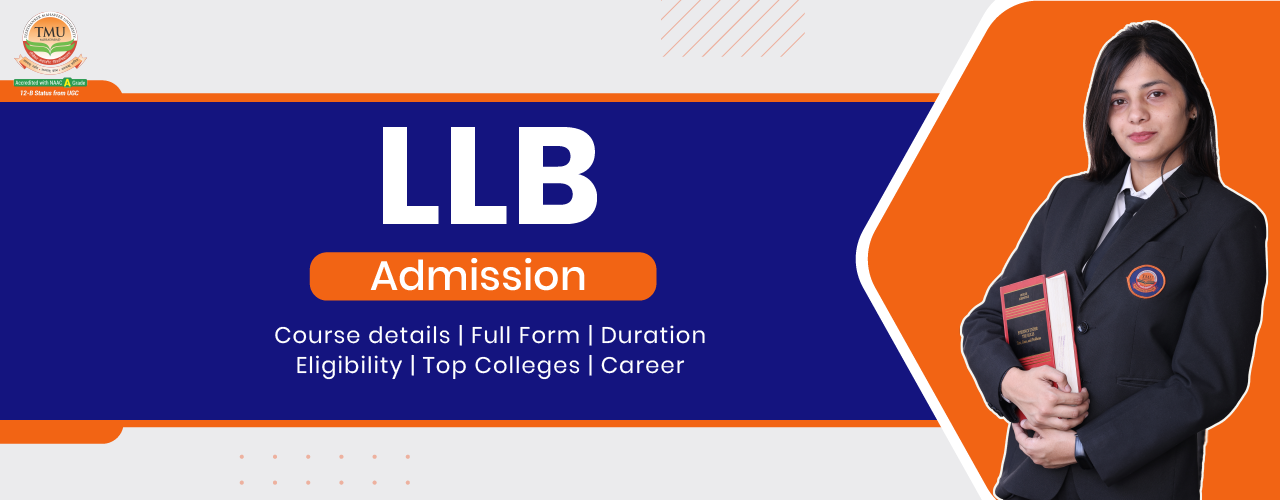LLB Course Details: Full form, Duration, Eligibility, Top colleges, and Career
Table of Contents
An LLB course is a professional undergraduate degree program in the field of law. The degree offers a strong foundation in legal principles and the legal system. The modules of this course cover numerous legal subjects like contract law, civil law, criminal law, property law and Constitutional Law. Through this course, candidates can get a broad spectrum of the legal system. The course prepares students to understand the legal system and interpret laws.
Basically, the LLB course is a 3-year degree program, but students can also pursue an integrated 5-year LLB course directly after Class 12. The course provides both theoretical and practical knowledge through case studies, moot courts, etc.
To pursue the LLB course, you just need to qualify for the common entrance exams like CLAT, LSAT, AILET, or other state-level law entrance tests.
The full form of the LLB course is Legum Baccalaureus (in Latin), which means Bachelor of Laws. The course covers the key subjects like introduction to law, criminal law, corporate law, family law, property law, civil law, labour law and environmental law. Students also need to prepare for assessments like exams, moot court performances, coursework, presentations and a dissertation.
Overview of LLB
| Feature | Details |
| Full Form | Bachelor of Laws |
| Type of Course | Undergraduate |
| Duration | 3 Years (after graduation) |
| 5 Years (Integrated LLB, e.g., BA LLB, BBA LLB) | |
| Eligibility | For 3-Year LLB: Bachelor’s degree in any discipline with 45%-50% marks |
| For 5-Year LLB: Completion of 10+2 with 45%-50% marks | |
| Admission Process | Entrance Exam-Based (e.g., CLAT, AILET, LSAT India) |
| Merit-Based Admission in some universities | |
| Top Specializations | Corporate Law, Criminal Law, Constitutional Law, Family Law, Intellectual Property Law |
| Course Fees | ₹30,000 - ₹2,00,000 per year (varies by institution type) |
| Career Options | Lawyer, Legal Advisor, Judge, Corporate Legal Consultant, Academician |
| Salary Range | ₹3-6 LPA (entry-level); experienced professionals earn ₹8-20 LPA or more |
Variants of the LLB Course
There are two types of LLB courses:
- 3-Year LLB: This is a postgraduate-level degree program for graduates who completed a bachelor's degree in any field. The duration of this program is 3 years, which is divided into six semesters. The focus subject of this course is law.
- 5-Year Integrated LLB: This is an integrated LLB program. It combines a bachelor's degree with LLB, like BA LLB ( Arts+Law), BBA LLB (Business Administration + Law) and BSc LLB (Science + Law). The duration of this program is five years, divided into 10 semesters. The focus subjects of this course are the arts, business, science, + law.
Teerthanker Mahaveer University
Apply for Admission
Click Here To Apply for Admission
Differences Between BA.LLB vs BBA.LLB vs BCOM.LLB
| Feature | BA LLB | BBA LLB | B.Com LLB |
| Focus | Law with Arts and Humanities | Pursuing Law with Business Administration and Management | Commerce and Trade with Law |
| Curriculum | Political Science, Sociology, History, English, Economics + Law subjects | Management Principles, Business Environment, Marketing, Finance, HR Management + Law subjects | Accounting, Finance, Taxation, Business Statistics, Economics + Law subjects |
| Career Path | Civil services, Public administration, Academia, NGO roles | Corporate law, Business consulting, Corporate governance, Management roles in legal departments | Corporate law, Tax consultancy, Financial regulation, Banking law, Commercial litigation |
| Duration | Five years | 5 years | Five years |
| Ideal For | Students interested in societal issues and public policy | Those Students who are aiming for the corporate sector and management positions | Students focusing on finance, commerce, and the corporate sectors |
| Skillset Developed | Analytical thinking, Understanding of social contexts, Policy Analysis | Business acumen, Management skills, Corporate governance | Financial analysis, Taxation knowledge, Commercial awareness |
LLB Subjects and Curriculum-3-Year Program
| Semester | Core Subjects | Additional / Practical Subjects |
| Semester 1 |
| - Moot Court Introduction |
| Semester 2 |
| - Legal Writing & Drafting |
| Semester 3 |
| - Court Visits / Internships |
| Semester 4 |
| - Drafting, Pleading & Conveyancing |
| Semester 5 |
| - Professional Ethics & Professional Accounting System |
| Semester 6 |
| - Moot Court Exercise & Internship Report |
5-Year Integrated LLB Curriculum
| Semester | Core Law Subjects | Social Science (BA) | Business / Management (BBA) | Finance / Commerce (B.Com) | Practical / Skill-Based |
| Semester 1 | Legal Method, Law of Contract – I | Political Science – I | Principles of Management | Financial Accounting – I | Legal English |
| Semester 2 | Law of Contract, II- Law of Torts | Sociology – I | Business Communication | Microeconomics | Legal Writing |
| Semester 3 | Constitutional Law – I, Family Law – I | Political Science – II | Marketing Management | Corporate Accounting | Moot Court Basics |
| Semester 4 | Constitutional Law – II, Family Law – II, Public International Law | History of Legal Systems | Organizational Behavior | Cost Accounting | Court Visits |
| Semester 5 | Administrative Law, Property Law- Jurisprudence – I | Sociology – II | Human Resource Management | Business Statistics | Drafting, Pleading |
| Semester 6 | Jurisprudence – II, Law of Crimes – I, Company Law | Political Science – III | Strategic Management | Corporate Finance | Internship – I |
| Semester 7 | Law of Crimes – II, Evidence Law, Environmental Law | Sociology – III | Business Ethics | Auditing & Assurance | Professional Ethics |
| Semester 8 | Labour Law – I, Human Rights Law | History – II | Entrepreneurship Development | Financial Markets | Drafting & Conveyancing |
| Semester 9 | Civil Procedure Code (CPC), Intellectual Property Rights (IPR), Arbitration & Conciliation | Political Science – IV | International Business | Taxation Law | ADR & Clinical Legal Education |
| Semester 10 | Cyber Law- Banking Law, Investment & Securities Law | Sociology – IV | Business Law Strategy | Advanced Taxation | Dissertation & Moot Court |
Eligibility Criteria for LLB Course
To be eligible for the LLB course, you must meet the following eligibility criteria:
Traditional 3-year LLB
- Bachelor’s Degree: To apply for the 3-year traditional LLB degree program, you must have completed your bachelor’s program from a recognised university or college. You need to achieve a minimum of 50% marks.
- Entrance Exam: Some universities require you to take an entrance exam for admission, such as CLAT, AILET, LSAT India, MH CET Law and SLAT.
Integrated 5-Year LLB
- 12 Qualification: As you know, an integrated LLB course is a combined program with a bachelor's degree. You can pursue the integrated LLB directly after 12th. You must qualify for the 10+2 from a recognised board or university with a minimum of 50% marks.
- Entrance Exam: Similarly to the 3-year LLB, you have to qualify for the entrance exam to pursue an integrated LLB.
LLB Course Admission Process
Here’s a short breakdown of the admission process for the LLB course:
Eligibility Criteria
- You must meet the eligibility criteria mentioned above for the LLB 3-year program and the integrated LLB 5-year program.
- You have to achieve a minimum of 50% marks from the recognised board or institution.
Entrance Exam
- To apply for the LLB course, you must have registered for the entrance exam.
- Appear for the exam on the scheduled date.
Application Process
- Fill out the application form for your preferred law college or university.
- While submitting the application fee, you need to submit the required documents, including academic transcripts, entrance exam scores, identification proof, and passport-sized photographs.
- After submitting the form, pay the application fee.
Merit List and Counselling:
- Universities or colleges release the merit list based on academic scores and the entrance exam.
- All shortlisted candidates need to attend the counselling sessions.
Admission Offer:
- The institute conducts a personal interview session before admission to check your skills.
- Based on your performance in the entrance exam, counselling, and interview, you will receive the admission offer.
- After accepting the admission offer, pay the application fee and confirm your seat.
Final Admission:
- You need to verify all the submitted documents.
- Enrol and attend the classes
Key Documents
- Mark sheets of secondary education.
- Entrance exam scorecard
- Birth certificate
- Identification evidence
- Passport-sized photographs
- Caste certificate (where necessary)
- Transfer certificate or migration certificate (where necessary)
Conclusion
If you are interested in legal studies, you can pursue an LLB course. It offers diverse career opportunities and develops strong critical thinking and communication skills. After pursuing the LLB course, you can work as a lawyer, legal advisor, judge, or legal journalist. While studying, you can also develop strong verbal and written communication. It is a profession that is respected and held in high regard in society.
FAQ
Q1. What is the LLB course?
Ans. An LLB is a professional undergraduate law degree program. The duration of this course is 3 years, divided into 6 semesters. You can also pursue an integrated LLB, a combined bachelor's degree program with LLB.
Q2. Can LLB be done in 2 years?
Ans. No, the LLB course generally takes 3 years to complete, and an integrated LLB course takes 5 years to complete.
Q3. Who is eligible for LLB?
Ans. If you have completed your graduation with at least 50% marks from a recognised university, you can pursue a 3-year LLB course. For pursuing a 5-year LLB program, you have to complete 10+2 with a minimum of 50% marks.
Q4. Which is better, a 3-year or a 5-year LLB?
Ans. Both are good courses. The choice depends on your career goal and academic background.
This content gives an overview of the programme and is for educational purposes only. For updated admission guidelines and counselling support, please connect with our Counsellor Team.














